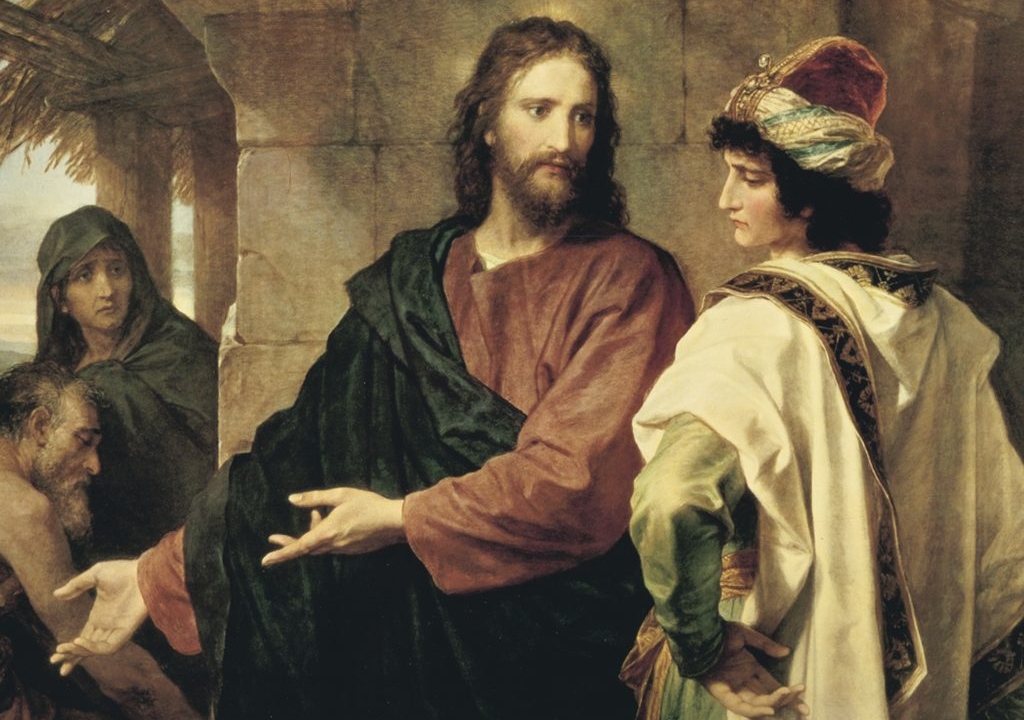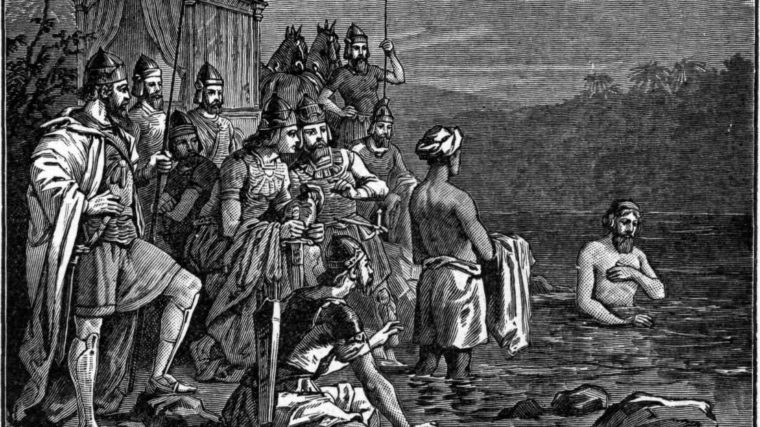Mark 10:17-27
As Jesus started on his way, a man ran up to him and fell on his knees before him. “Good teacher,” he asked, what must I do to inherit eternal life?”
“Why do you call me good?” Jesus answered. “No one is good – except God alone. You know the commandments: ‘Do not murder, do not commit adultery, do not steal, do not give false testimony, do not defraud, honor your father and mother.’”
“Teacher,” he declared, “all these I have kept since I was a boy.”
Jesus, looking at him, loved him. “One thing you lack,” he said. “Go, sell everything you have and give to the poor, and you will have treasure in heaven. Then come, follow me.”
At this the man’s face fell. He went away sad, because he had great wealth.
Jesus looked around and said to his disciples, “How hard it is for the rich to enter the kingdom of God!”
The disciples were astonished at his words. But Jesus said again, “Children, how hard it is to enter the kingdom of God! It is easier for a camel to go through the eye of a needle than for a rich man to enter the kingdom of God.”
The disciples were even more astonished, and said to each other, “Who then can be saved?”
Jesus looked at them and said, “With man this is impossible, but not with God; all things are possible with God.”
To me, this is one of the most tender, and one of the saddest, stories in the gospels. The story is familiar. So familiar, in fact, that we sometimes miss the intensity of the drama, the passion, in this little vignette.
You can feel the deep desire of the young man to follow the Way. He must have heard of Jesus, or seen him before, and felt his heart pulling him. He runs up to Jesus and falls onto his knees in front of him. “Please tell me what I must do,” he begs. During their little interchange about the commandments, Jesus sees the young man’s sincerity. “Looking at him, he loved him.” The man really wants the kingdom, and Jesus wants it for him.
But the young man is clinging to something, part of him is holding back. Jesus sees right where he is stuck and goes for it. Property, possessions, wealth. “Sell it all. Give it away. Then you will be free to follow me.”
The young man is crushed. He face falls. He can’t do it. He is clinging and can’t let go of his wealth. And he goes away sorrowing. And Jesus, also, is sad. You can hear it in his response. “How hard it is.” “It is easier for a camel to go through the eye of a needle than for a rich person to enter the kingdom of God.”
The disciples, on the other hand are dumbfounded. We have been told that in Jesus’ day, being wealthy was a sign of God’s favor. But I don’t think that is any different from our own day. The people who are most admired are the rich and famous. As Lev Tevya says in Fiddler on the Roof:
If I were a rich man,
the most important men in town
will come to fawn on me.
They will ask me to advise them
like a Solomon the wise,
posing questions that would cross a rabbi’s eyes.
And it won’t make one bit of difference
if I answer right or wrong.
If you’re rich, they think you really know.
“If you’re rich, they think you really know.” Even we, who may wish to think we are not swayed by the fact of someone’s wealth, are not really immune, are we? We are more likely to trust the opinion of someone who is wealthy or powerful or who has status or prestige. I, at least, gravitate more towards someone who is neatly dressed than towards the shabbily clad people at the east end of Union Street, whom I try not to see as I drive home from BTS.
I don’t think that Jesus is merely giving a diatribe against the rich. But money is problematic. It is hard not to cling to it. In my own life, I have noticed that in those times when I didn’t have any money, I wished I did. And in those times when I had some, I found myself thinking about how to keep it – save it for my retirement, whenever that may be.
Money is a problem, but it’s not the only one. Anything we cling to, anything at all, is our wealth. A rich person is someone who is holding on to anything. That is, it is all of us. We all cling. We are all rich in this way. “It is easier for a camel to go through the eye of a needle than for a rich person to enter the kingdom of God,” Jesus says. He is speaking to each one of us.
One of the methods of Zen training is the systematic study of koans. A koan is a paradox, a conundrum, which cannot be understood with the rational mind. The most commonly known koan – which is nearly always misquoted – is: “What is the sound of one hand?” Responding to a koan requires going beyond ordinary thinking. Rather, it requires a leap to another level of comprehension. We tell people to “just sit” with a koan. Don’t think about it.
One koan is the question, “How do you step forward from the top of a hundred foot pole?” The explanation that is given for this koan is:
You who sit on the top of a hundred-foot pole,
although you have entered the Way, it is not genuine.
Take a step from the top of the pole
and worlds of the Ten Directions are your total body.
Not much of an explanation, is it?
This koan is actually about spiritual attainment. “You who have entered the Way” is the Zen way of talking about those who have acquired some understanding but are not yet fully enlightened. They are sitting on top of a hundred foot pole, holding on for dear life. How can they go forward? They have experienced some awakening and are proud of it. They’re clinging to it for all they’re worth. And the only way to move on, to actually enter the kingdom of God, is to step off that pole. To pass camel-like through the needle’s eye.
We seminarians might, just might, be in a somewhat similar position. We might think that now we really know something. We’ve studied the scriptures, and now we understand them. We’ve studied theology, and now we know a lot about God. We’ve learned ethics and pastoral care and done mentored practice. And now we even know how to preach. Now we have really found God.
Well, we may not really think we’ve found God. And seminary can be more humbling than ego-inflating. Yet, spiritual pride is always a danger in the religious professions. Those to whom we minister see us as better than we know we are, and we run the risk of believing them. We represent God to many, and we are always in danger of believing that we really represent God.
Anything, anything at all, that we have or have done or are, can be the riches that prevent us from entering the kingdom. Anything we identify with, any self-identification, that we cling to. We have to constantly be in a process of letting go if we wish to enter that kingdom.
It is not only things that we are proud of that we cling to. My husband and I used to run a Zen group in a maximum security prison in New York. The guys who came to the group had sentences of twenty-five or forty years to life. They had all committed murder or rape or larceny. Stef presented the hundred foot pole koan to them and had them meditate on it for awhile. At the end of the day, he asked each inmate to present his understanding without using words. One of the inmates got up and started digging. He dug and dug and dug. Then he jumped into his “hole” and shouted: “I don’t have a hundred foot pole. I have a hundred foot hole, and it’s full of my own shit!” Then he clawed at the air, as is trying, unsuccessfully, to claw his way out. He had a deep realization that he was living in his own excrement and clinging to it. He couldn’t let go of it. The rest of us all sat stunned, horrified. He too was a rich young man who couldn’t get through the eye of the needle, and he knew it. It was every bit as sad as the gospel story.
Anything, anything at all, that we cling to prevents us from entering the kingdom of God. It is all baggage in our hands that prevents us from passing through the eye of the needle. The trouble is, we are human. Our inclination is to hold tightly to whatever we have. Even when we begin to see what a trap that is and start letting go, as soon as we have dropped one thing, we start clinging to the next. We hop from hundred-foot pole to hundred-foot pole. Somehow, each time, we fail to see that we’re doing it again. And each time, we hold on for dear life, until something makes us realize that this is just another hundred-foot pole. And we let go again. Maybe for just a few seconds. But, if we want to enter the kingdom, we have to keep on letting go. As soon as we see that we’re holding on – drop it. Until, finally, we run out of things to hold on to.
The mystics knew all about this clinging. Much of their writing is about stripping away everything that we think or believe or hold onto, first about ourselves, and then about God. Any ideas or opinions that we hold prevent us from seeing. Any thought or belief we may have about God will keep us from experiencing God.
The German mystic Meister Eckhart, in his radical sermon “Blessed Are the Poor in Spirit,” says that the truly poor in spirit neither know nor desire nor have God. In order to be united with God, we must be empty of knowledge of God or desire for God. In fact, “we pray God that we may be free of God.” It is only when we are completely empty that we are poor enough to be united with God.
This all sounds very highfalutin, doesn’t it? But it is not far away or difficult. We are all given moments of such emptiness. Moments when we are out in nature, perhaps, and we lose ourselves. All of a sudden there is only bird song. Or stream. Or sunshine. Moments when we are with someone and we feel their pain as our own. Our selves drop out of the equation.
To consciously enter into emptiness requires making a choice. Deciding that this is what we want. And then we will begin to notice where we are sticking. What we are holding on to. What our riches are. And we can choose to drop whatever comes up. Moment by moment, thing by thing, we can open our hands and let go.
When we make this choice, grace is given. The grace necessary to carry it to completion. As Jesus said, it is impossible for humans as humans to make this choice, to become empty. But with God, or through Enlightened Nature, it becomes possible. It becomes possible for us to allow our hands, our minds, our hearts to be emptied. To be open. It takes persistence and courage, but it is possible. It becomes possible to sell all that we have, to let go of all that to which we cling. It becomes possible to jump from that hundred-foot pole. It becomes possible for us camels to shed our humps and pass through the eye of the needle. We will be carried into the kingdom of heaven.



